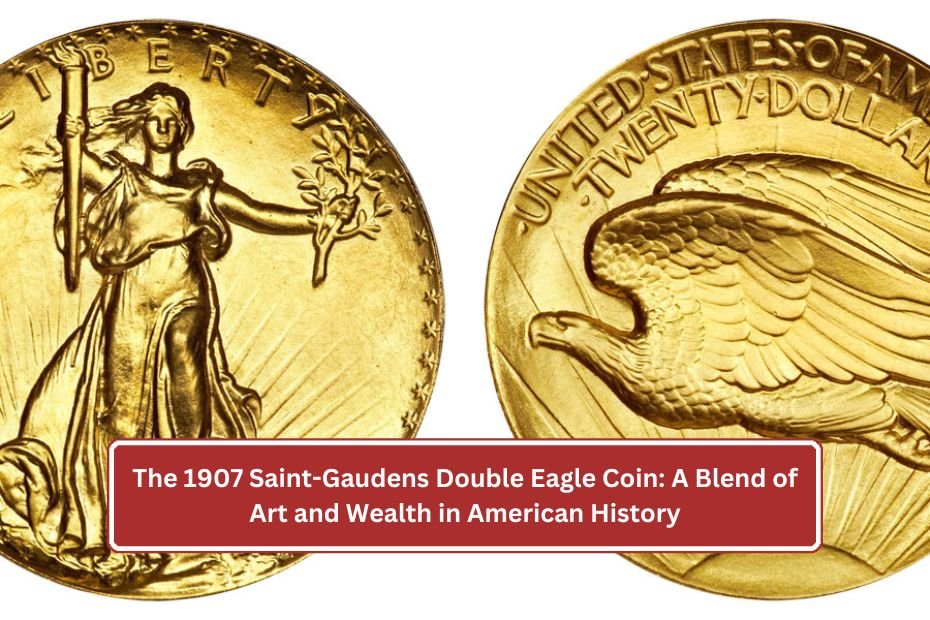The 1907 Saint-Gaudens Double Eagle High Relief Wire Rim coin is one of the most fascinating pieces of American currency. Designed by the famous sculptor Augustus Saint-Gaudens, it has a rich history that collectors love to explore. This guide will break down everything you need to know about this unique coin, its background, features, and why it’s so valuable today.
The Background of the Saint-Gaudens Double Eagle
In the early 1900s, the United States aimed to improve its coins to reflect the artistic quality of ancient Greek currency. Frank A. Leach, who was the Director of the U.S. Mint, played a key role in this effort. President Theodore Roosevelt was very interested in redesigning the gold coins, wanting them to look more beautiful and artistic.
In 1905, President Roosevelt authorized the Mint to work with Augustus Saint-Gaudens to create new designs for the $20 and $10 gold coins. The idea was to produce coins with a high relief, meaning they would have deep, raised designs. This would make the coins look more impressive and artistic.
However, making these high-relief coins turned out to be challenging. The Mint found it hard to produce them using regular minting presses. They needed to strike the coins multiple times to get the details right, which was impractical for mass production. As a result, only a few of the ultra-high relief coins were made, making them extremely rare today.
What Is a Wire Rim?
One of the most interesting features of the 1907 Saint-Gaudens Double Eagle is the “Wire Rim.” This term refers to a thin edge of metal that sticks out around the coin. This happened because the collar used during the minting process was too loose, allowing extra metal to spill over. While collectors now see the Wire Rim as a unique feature, mint officials initially thought it was a mistake.
By December 1907, the Mint corrected this issue by changing the collar, leading to the creation of what is now known as the Flat Rim coins. These changes did not diminish the beauty of the coin, and many collectors sought out the Wire Rim version for its rarity and uniqueness.
Why Is the 1907 Saint-Gaudens Double Eagle Valuable?
The 1907 Saint-Gaudens Double Eagle High Relief Wire Rim is highly sought after by collectors for several reasons:
| Reason | Description |
|---|---|
| Limited Production | Only around 12,000 of these coins were made, and many were melted down, making surviving examples very valuable. |
| Artistic Design | The coin features a stunning design by Augustus Saint-Gaudens, depicting Lady Liberty on the front and an eagle on the back. Its artistic appeal adds to its desirability. |
| Historical Significance | This coin represents a significant moment in American history, as it was part of a movement to improve the country’s currency. |
| Market Demand | As more collectors seek this piece, the price has steadily increased. Some examples have sold for hundreds of thousands of dollars at auction. |
Beware of Counterfeits
While the 1907 Saint-Gaudens Double Eagle is a treasure, collectors must be cautious of fakes. In the early 1970s, counterfeit versions began appearing, especially during coin shows. These fakes can have noticeable flaws, such as strange marks in the design or differences in weight. Authenticating a coin through a professional grading service is crucial to ensure it’s genuine.
The Coin’s Specifications
Here are the key details of the 1907 Saint-Gaudens Double Eagle:
| Specification | Detail |
|---|---|
| Country | United States of America |
| Year of Issue | 1907 |
| Denomination | $20 |
| Mintmark | None (Minted in Philadelphia) |
| Mintage | 12,367 coins |
| Metal Composition | 90% gold, 10% copper |
| Weight | 33.4 grams |
| Diameter | About 34.0 mm |
| Edge | Lettered with “E PLURIBUS UNUM” |
| Designer | Augustus Saint-Gaudens |
Market Data and Noteworthy Sales
In the world of coin collecting, sales of the 1907 Saint-Gaudens Double Eagle have made headlines. Below is a summary of some notable sales:
| Condition | Sale Price | Sale Date | Auction House |
|---|---|---|---|
| PCGS MS69 | Notable example | – | – |
| PCGS MS67 | $288,000 | August 16, 2023 | Stack’s Bowers |
| PCGS MS66 | $108,000 | March 26, 2024 | Stack’s Bowers |
| PCGS MS66 | $72,000 | November 14, 2019 | Stack’s Bowers |
| PCGS MS65+ | $49,937.50 | August 7, 2012 | Stack’s Bowers |
| NGC MS65 | $39,600 | July 20, 2023 | Heritage Auctions |
| PCGS MS64+ | $31,200 | August 15, 2018 | Stack’s Bowers |
| PCGS MS64 | $34,075 | August 7, 2012 | Stack’s Bowers |
Conclusion
The 1907 Saint-Gaudens Double Eagle High Relief Wire Rim coin is more than just currency; it’s a piece of art and history. From its beautiful design to its limited production, it stands out in the world of numismatics. Collectors appreciate its value, artistry, and the story behind its creation. Whether you’re a seasoned collector or just starting out, understanding this coin can enrich your appreciation of American history and art.
This coin represents not just wealth but also the effort to make U.S. currency reflect the artistic standards of its time. As you explore the world of coin collecting, the 1907 Saint-Gaudens Double Eagle Wire Rim will always hold a special place due to its beauty and rarity. The knowledge of its history and features will help collectors make informed decisions about their collections.
FAQ’s
What Is Special About the 1907 Saint-Gaudens Double Eagle High Relief Coin?
The 1907 Saint-Gaudens Double Eagle High Relief coin is notable for its stunning design by Augustus Saint-Gaudens and its unique Wire Rim, which results from a minting error. Only about 12,000 were produced before the design was changed, making it a sought-after collectible.
How Can I Verify the Authenticity of My 1907 Coin?
To verify your coin’s authenticity, have it graded by a professional service like PCGS or NGC. Check for weight (33.4 grams), sharp details, and familiar features of the Wire Rim variety to help identify counterfeits.
What Is the Value of the 1907 Saint-Gaudens Double Eagle Coin?
The value of the 1907 Saint-Gaudens Double Eagle High Relief coin varies widely. High-grade examples can sell for over $288,000, while lower-grade coins may be worth thousands. Recent auction results and expert appraisals can provide accurate estimates.

